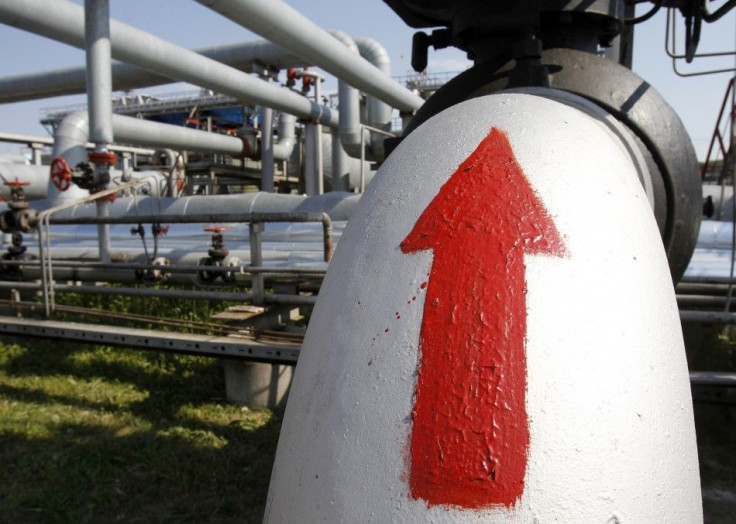Ukraine To Increase Natural Gas Production, Decrease Dependence On Russian Energy

Ukrainian Prime Minster Mykola Azarov announced on Tuesday that Ukraine will ramp up its natural gas production by up to 25 percent over the next three years, a move that could help the country break free of its energy dependence on neighboring Russia.
Ukraine has chosen to partner with Western oil companies Royal Dutch Shell and Chevron to develop two of its shale gas fields. Both companies outbid other contenders for the partnership, including Russian company TNK-BP.
With 42 trillion cubic feet of shale gas reserves, Ukraine has the fourth-largest potential supply of natural gas in all of Europe, according to the Financial Times. But due to a history of inefficient energy practices and stalled development, the country still imports most of its natural gas from Russia.
While Azarov made his projection in Brussels, Ukrainian President Viktor Yanukovich talked to reporters in Moscow about plans to modernize Ukraine's gas infrastructure and diversify energy suppliers.
We are working, for instance, with Turkmenistan, we are also working with Azerbaijan, and we are seeking such opportunities, he said. Why? Because we are unhappy with the price for Russian gas. And this is quite natural.
A Strained Relationship
These announcements could mark a turning point in a long history of energy-related economic co-dependence between Russia and Ukraine.
The dispute between Russia and Ukraine has its roots in the Cold War economic relationship between the Soviet Union and Ukraine, reported the Journal of Energy Security (JES) in 2011.
As part of its satellite system, the USSR built the Ukrainian pipeline system to supply Eastern Europe with gas from Russia and its Central Asian republics.
Today, Russia is a huge exporter of natural gas to the European Union, meeting over 40 percent of its demand. A full 80 percent of that supply travels through Ukrainian pipelines, and Ukraine itself is one of Russia's top importers.
This has created a tense relationship.
In the post-Cold War era, while Russia has sought to raise the prices that Ukraine pays for gas, Ukraine has habitually used its near- monopoly on gas transit routes from Russia to Europe to push back, said the JES report.
The knotty situation came to a head after Ukraine's Orange Revolution of 2004 and 2005, when pro-Western politician Yulia Tymoshenko was elected as Prime Minster of Ukraine and the relationship between Moscow and Kiev deteriorated.
This conflict eventually precipitated one of the worst energy crises in Europe three years ago, when Russia accused Ukraine of stealing gas and switched off all supplies that ran through Ukrainian pipelines. Countries across Europe found themselves scrambling for alternative sources of fuel, and Brussels pressured Moscow and Kiev to resolve their dispute.
Russia's Raw Deal
Tymoshenko met with Russian President Vladimir Putin in January of 2009 to negotiate a solution that would restore the flow of Russia's natural gas through Ukraine's pipelines. Under the deal, arrangements between the two countries were somewhat liberalized in 2010. But an economic crisis in Ukraine prompted a fall from grace for Tymoshenko, who lost a 2010 presidential election against Viktor Yanukovich, her former rival and a Kremlin-allied politician.
The JES reports that with Yanukovich in power, Russia quickly agreed to a new gas pricing arrangement that lowered prices from agreed levels and was widely perceived as a return to the policy of subsidized Russian gas prices for friendly states.
In August of last year, the government charged Tymoshenko with abuse of power due to the deal she signed with Putin in 2009.
Tymoshenko was accused of hurting the Ukrainian economy by agreeing to inflated gas prices that cost the state about $440 million in damages. She was arrested and imprisoned until a hunger strike and chronic health problems motivated the government to move her to a Ukrainian hospital. The international community has called for her release, and an appeal hearing is scheduled for late June.
Caught Between The Lines
Facing censure from Western powers for his treatment of Tymoshenko, Kremlin opposition to Ukraine's proposed diversification of energy supplies, and fears that corruption may undermine the nascent agreement with Chevron and Shell, Yanukovich is moving ahead cautiously in order to quell a potential firestorm of diplomatic disputes.
The current situation is driving us into a corner, he said to Ukrainian newspaper KyivPost on Tuesday. I am not saying it's a dead end, but we have to seek diversification.... But we are not parting with our partners [in the Kremlin] today, and they understand very well in what position we are now.
© Copyright IBTimes 2024. All rights reserved.





















